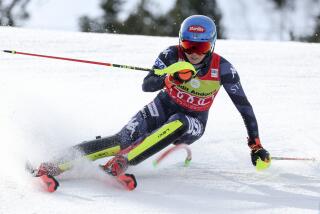WINTER OLYMPICS : HE GETS THE GATE : Zurbriggen Catches a Tip and Loses a 2nd Gold Medal When He Tips Over
- Share via
CALGARY, Canada — ZuperSkier proved he is just like the rest of the boys Wednesday. He puts his skis on one binding at a time, and there are times when he can’t fly.
On an anti-climactic day at Nakiska, Pirmin Zurbriggen took a fall, and a guy who finished fifth and seventh in successive races won a gold medal.
It was supposed to be gold medal No. 2 for Zurbriggen, who can relax now that the pressure of trying to win five golds in a row has vanished, blown away a little more than 20 seconds into his second slalom run--when virtually all he had to do was snowplow down the course.
“Maybe I was too relaxed, too confident,” Zurbriggen said after he hooked a tip and skied over one of the springy “rapid-gates” that marked the course, lost his balance and cartwheeled into the snow.
As a result, the new Olympic downhill champion from Switzerland could merely watch in disbelief as Hubert Strolz of Austria received the gold medal in the combined, a funny little event that is decided on total points scored in an abbreviated downhill, which Zurbriggen won on Tuesday (after winning the regular men’s downhill the day before), and a slalom, which Switzerland’s Paul Accola won on Wednesday.
In the final standings, with lowest score winning, Strolz had 36.55 points on the basis of his fifth in downhill and seventh in slalom; teammate Bernhard Gstrein took the silver medal with a 15th and a third for 43.45 points, and Accola earned the bronze with a 24th and a first for 48.24 points.
Zurbriggen began the day with a seemingly unbeatable lead over the field as a result of his victory in the combined downhill, and he retained most of that margin by skiing the first run of the slalom in 44.32 seconds, tied for the sixth fastest time and just 1.74 seconds behind the leader, Accola.
After lunch, Zurbriggen took off on his second run, skiing as conservatively as is possible for someone with his athletically aggressive nature. His intermediate time was 19.33 seconds, only the 10th fastest of the run, as it turned out, but good enough to have kept him well ahead had he maintained that pace to the finish.
Instead, he crashed, and any hope for a sweep of the five Alpine gold medals went down in flames.
Strolz, whose two-run slalom time was 2.38 seconds behind Accola’s 1:24.93, came down just ahead of Zurbriggen and was one of the first to console him at the bottom of the hill.
“Pirmin said that when he hooked his ski tip, it all happened so quickly, he didn’t realize for a moment what had happened,” Strolz said. “I think it’s a shame that he couldn’t finish the race. We are good friends. I had expected him to win, and I would have been satisfied with the silver medal.”
Strolz, 25, hasn’t won many World Cup races, but he has quite a few second and third places. He is considered the leader of a powerful but young Austrian slalom team and is also a close friend of two-time World Cup champion Marc Girardelli, an Austrian who skis for Luxembourg. The two frequently travel the circuit together and play chess to kill time at airports.
“I never thought I could be an Olympic champion,” said Strolz, whose favorite hobby off the slopes is beekeeping. No kidding. He seemed genuinely disappointed that Zurbriggen hadn’t gotten the gold, saying: “Pirmin is just a super human being. He has never gotten the big head and still talks to everyone, just like he always did before he started winning so much.
“Today, he tried to ski as he usually does, but if you are too relaxed, you can make small mistakes. It is easier to keep your concentration if you just go for it.”
Zurbriggen, whose only injury was to his medal chances, wasn’t the only skier to fall on a cold, windy day with snow flurries on Mt. Allan. The first run claimed 13 of the 43-racer field, including contenders Guenther Mader of Austria and Felix McGrath of the United States, and the second run knocked off four more.
McGrath was bopping fluidly along until he suddenly got behind in his rhythm about two-thirds of the way down. This made him late coming into a gate, and when he tried to over-compensate, it was all over. McGrath was also unhurt.
McGrath will have other chances to win a medal for the U.S. ski team, beginning next Thursday in the giant slalom. But for now, he said, “I’m getting away from here and going over to Lake Louise to train.”
Zurbriggen, meanwhile, will try again for his second gold medal in the super-G race Sunday, but today, at least, he’ll probably cut back on his training in favor of spending some time with his steady girlfriend, Monika Julen.
Proving in still another way that, after all, he’s only human.
Skiing Notes
After two Alpine events, the Swiss have three medals (a gold, a silver and a bronze); the Austrians have two (a gold and a silver), and the French have one (a bronze). . . . The women’s downhill will be held today, with Switzerland’s Michela Figini favored to successfully defend the Olympic title she won in 1984 at Sarajevo, Yugoslavia. . . . Figini had only the 10th fastest time in the final training run Wednesday, as Golnur Postnikova of the Soviet Union led the way in 1:18.31. Figini was clocked in 1:19.68, but apparently eased up near the bottom of the shortened course. . . . American Pam Fletcher was right behind Figini in 1:19.90. . . . The women’s combined will be held Friday (downhill) and Saturday (slalom).


